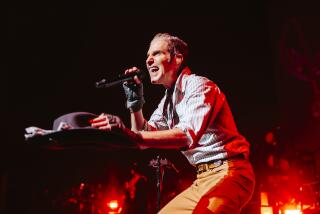James Gurley dies at 69; guitarist with Big Brother & the Holding Company
James Gurley, a virtuoso guitarist with Big Brother & the Holding Company, the psychedelic rock band that launched Janis Joplin to stardom, died Sunday, two days before his 70th birthday.
Gurley was pronounced dead at a Palm Springs hospital after suffering a heart attack at his Palm Desert home, according to the band.
“James was the spirit and the essence of the band in its early days,” Sam Andrew, a Big Brother singer-guitarist, wrote on the band’s website. “James was the most unusual person I ever met, a pioneer, a real original. . . .”
In 1965, Gurley was playing guitar on San Francisco’s coffeehouse circuit when Chet Helms, Big Brother’s manager, invited him to jam with the nascent band.
Gurley’s spellbinding finger-picking on the electric guitar “proved to be the missing component,” according to a biography on the band’s website, and he became the center of Big Brother’s free-form style.
Many of his peers consider Gurley the fountainhead of psychedelic guitar-playing, which “gets improvisational and goes out to this place where the beat is assumed,” Barry Melton, lead guitarist for Country Joe & the Fish, told Guitar Player magazine in 1997.
“The music is kind of out there in space, and James Gurley was the first man in space! He’s the Yuri Gagarin of psychedelic guitar,” Melton said.
Gurley “was the star of Big Brother,” the group’s drummer, Dave Getz, said on the band’s website, “and then Janis came along.”
As they played informal concerts in a basement ballroom of a San Francisco boardinghouse, Helms told the band, “You need this chick I know in Austin,” Dennis McNally, a historian for the Grateful Dead, said in a 2005 Times interview.
“The band went, ‘Right, right.’ He sent a friend of his to Austin to bring Janis out here, and the rest is history,” McNally said.
With Joplin joining the group as lead singer in 1966, Big Brother soon turned into one of the Bay Area’s leading attractions. Her fierce, “blues-soaked delivery provided the perfect foil to the unit’s instrumental power,” according to “The Encyclopedia of Popular Music.”
Big Brother became a sensation with its 1968 “Cheap Thrills” album, which featured Gurley’s intense, raw sound on such hits as “Piece of My Heart” and “Ball and Chain.”
After Joplin left the band in 1968 for a solo career, the group disbanded. She died of a heroin overdose in 1970.
Big Brother reconvened in 1969, with Gurley and Andrew in the lineup, but after releasing two more albums, the band broke up again in 1972.
In 1987, the early members of Big Brother reunited and Gurley toured with them for a decade but left after a falling out.
“James was a large personality,” Getz wrote on the band’s website. “He had real charisma. He was as unique an individual as they come. For a moment in time he was ‘the man.’ ”
Born Dec. 22, 1939, in Detroit, Gurley was the son of a stunt-car driver and learned at an early age to be adventurous.
As a boy, he sometimes served as a “human hood ornament” by riding on the front of cars while his father drove through walls of fire and other obstructions, according to a biography on the band’s website.
By age 19, Gurley was teaching himself to play acoustic guitar, partly by listening to records by Lightnin’ Hopkins, a country blues guitarist.
Gurley also was inspired by a 1963 performance by jazz saxophonist John Coltrane. “I heard a lone saxophone raging like a madman,” he told the Palm Springs Desert Sun in 2007. “I said, ‘That’s the way to play, like a madman.’ And that’s what developed my style: Play it like crazy.”
After Joplin joined Big Brother, she and Gurley had a brief affair that ended when his wife, Nancy, confronted them while holding the Gurleys’ young son, according to the 2000 Joplin biography “Scars of Sweet Paradise.”
On “Pipe Dreams,” his 2000 solo album, Gurley included a song “For Nancy (Elegy),” a requiem to his first wife. When she died of a heroin overdose in 1970, Gurley was charged with murder for injecting her with the drug but was eventually sentenced to probation.
“I was a wild man, alcohol and drugs,” Gurley told the Oakland Tribune while in San Francisco in 2007 for the 40th anniversary concert marking the city’s Summer of Love. “I’m just glad to be here myself.”
Since moving to Palm Desert in the 1970s, he had performed with a New Wave band with his oldest son, Hongo, and recorded with New Age drummer Muruga Booker.
When asked what advice he would give a young guitar player, Gurley once responded: “Don’t listen to anybody.”
In addition to his son Hongo, Gurley’s survivors include his second wife, Margaret; and another son, Django.
The band is planning a public memorial to be held early next year in the Bay Area.
More to Read
Start your day right
Sign up for Essential California for the L.A. Times biggest news, features and recommendations in your inbox six days a week.
You may occasionally receive promotional content from the Los Angeles Times.







